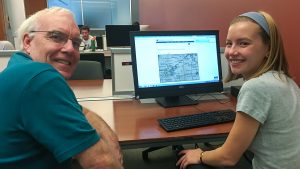Students and Faculty Collaborate: Using new Digital Tools for Research in the Humanities and Social Sciences
What could these seemingly unrelated topics possibly have in common? The students’ engaging presentations were all the fruits of the innovative Digital Humanities Summer Scholars program. For the past two summers, select groups of Lafayette students from a range of disciplines have organized themselves into research communities, hosted at Skillman Library’s Digital Scholarship Services (DSS) and supported by The Andrew W. Mellon Foundation, to learn the latest methods in data visualization and analysis. DSS partners with faculty and student researchers to develop digital research projects that feature innovative analytical approaches and dynamic digital tools. The 2016 Summer Scholars’ team was organized by Research and Instructional Librarian Sarah Morris.
At the presentations, Tawfiq Alhamedi ’17 (anthropology and sociology major) explained how he was able to recreate the geography of the medieval Indian Ocean with a program called ArcGIS, while Caroline Nawrocki ’18 (international affairs major) described how she identified shifting areas of interest in student activism at Lafayette College over the years. Wendy Wilson-Fall, associate professor of Africana studies and chair of Africana studies, mapped immigration from Madagascar to the United States with Clara Randimbiarimanana ’18 (anthropology and sociology major). Professor Christopher Phillips of the English department mentored a team of seven English majors—Gavin Jones ’14, Alena Principato ’15, Julia Campbell ’15, Cat Miller ’16, Eric Bockol ’16, Venita O’Hanlon ’16, and Sean Cavanagh ’18—to build The Easton Library Company Database. Professor Phillips’ path-breaking digital tool facilitates systematic investigation of 18th-century reading habits, community relationships, and family structures of Easton society on a publicly available website.
In addition to supporting the summer scholars and student-faculty collaboration on multi-year research projects, Lafayette’s Digital Scholarship and Teaching project also has brought new digital tools and methods into the classroom. In her popular course on Visual Culture and Religious Identity, Jessica Carr, assistant professor of religious studies, worked with students to curate a digital exhibit of images and articulate their own perspectives on their objects of study. In a campus brown-bag presentation given to faculty and students, Declan McGuire ’17 analyzed Arabic-language graffiti and street art as a variant of more traditional calligraphic arts. In Assistant Professor Trent Gaugler’s Mathematical Statistics class, students analyzed writing samples from Lafayette students to trace historical trends by formulating hypotheses and testing them by computational methods.
From their summer research and classroom experiences, Lafayette students have mastered a wide variety of tools and research methods. This knowledge has found its way back into other classrooms and faculty research. Recently, summer scholar Mila Temnyalova ’19 (international affairs major) lent her newly acquired skills to Paul Barclay, associate professor of history and chair of Asian studies. Mila has acted as a consultant for his ongoing seminar course in history and film and media studies on the visual culture of warfare and colonialism in East Asia by helping design digital-chronology components for classroom research projects.
Conceived and led by Neil McElroy, who recently retired as dean of Libraries, A Liberal Arts College Model for Digital Scholarship and Teaching received support of $700,000 over four years from The Andrew Mellon Foundation; Prof. Barclay succeeded Dean McElroy as the project director in summer 2016. Since spring 2013, the project has energized a number of forms of interdisciplinary teaching and research. Most importantly, it has promoted heightened levels of student-faculty collaboration. Exemplifying a long-running Lafayette College tradition, the project has provided research and mentoring opportunities for students in an undergraduate liberal arts setting with an interesting twist. Now the students are becoming the teachers.
Paul Barclay
Assoc. Professor & Chair, Asian Studies & History
barclayp@lafayette.edu
610-330-5178
